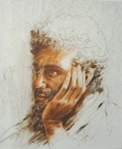Posts Tagged Socrates
PROTAGORAS of ABDERA (c.480 – c.411 BCE)
Posted by historyofscience101 in GREEK PHILOSOPHY on January 25, 2014
Of all things the measure is Man, of the things that are, that they are, and of the things that are not, that they are not.
About the gods, I am not able to know whether they exist or do not exist, nor what they are like in form; for the factors preventing knowledge are many: the obscurity of the subject, and the shortness of human life.
A contemporary of Socrates and later labelled a sophist by Plato, in 415 BCE Protagoras was forced to flee Athens because his works were condemned for impiety.
PLATO (c.427 – c.347 BCE)
Posted by historyofscience101 in GREEK PHILOSOPHY, HISTORY OF SCIENCE, INDEX, PLATO, WESTERN SCIENCE & THEOLOGY on January 24, 2014
387 BCE – Athens
The safest general characterisation of the European philosophical tradition is that it consists of a series of footnotes to Plato
So said the English mathematician and philosopher Alfred North Whitehead (1861-1947)
A pupil of Socrates, Plato was introduced to the notion of ‘reality’
being distorted by human perceptions, which became important in his approach to science and to metaphysics. Socrates taught a method of thinking that elucidated truth though a series of questions and answers. The Socratic method was to ask for definitions of familiar concepts like ‘justice’ and ‘courage’, and then probe the definition by asking a series of questions. His intention was to lead people to start to contradict themselves and in so doing uncover any weaknesses in the initial definition. Socratic dialogue is thus often better at revealing ignorance than producing answers. Socrates was convinced that the wisest people are those who are aware of how little they know.
Socrates fell foul of a newly elected democratic government and was put on trial for allegedly corrupting the youth of Athens with his rebellious ideas. He was sentenced to death and elected to drink hemlock rather than argue in favour of a fine or accepting the offer of help to escape. His rational for his obstinacy was that he believed that doing harm damaged one’s soul. As the soul survives death then it would be better to die.
PHILOSOPHY
Plato determined to reveal a world of certainty that existed beyond the world of change and decay. The physical world we see is merely the world of ‘becoming’ – a poor copy of the ‘real’ world of the Forms which can only ever be grasped through thought.
After PYTHAGORAS and HERACLITUS, most Greek philosophers believed that knowledge had to be as stable and fixed as the certainties of mathematics, kept safe from Heraclitan change and from sceptical relativism.
Knowledge could only come through thought and although observation was useful, it was an inferior and misleading way of understanding the world and the place of human beings within it. Such a view helps to explain why it is that the ancient Greeks invented extremely sophisticated mathematics, astronomy and philosophy but little in the way of technology.
Plato produced nearly all the central questions for philosophy in epistemology, metaphysics, ethics, politics and aesthetics.
Central to Plato’s thinking is that people should seek virtue studying what he called the Good, a non-physical absolute concept that never changes. If you know Good, you will live well because your thoughts and desires will automatically be shaped by that knowledge.
During the decade of his travels after the execution of Socrates, Plato wrote his first group of ‘dialogues’ – which include the ‘Euthyphro‘, ‘Apology’, the ‘Crito’, ‘Phaedo‘ – concerning the trial and death of Socrates.
Further accounts of Socrates debates with friends on various subjects are found in other works; ‘Charmides’ (temperance); ‘Laches’ (courage); ‘Lysis’ (friendship); ‘Hippas Minor’, ‘Hippas Major’, ‘Gorgias’, ‘Ion‘, and ‘Protagoras’ (ethics and education). In his plays, Plato used Socrates as a character, bringing his mentor back from the grave and throwing light on his concepts. In Gorgias, Plato portrays Socrates confronting Polus, or the sophist Callicles, who holds that immoral acts can bring the greatest amount of pleasure, measuring actions in terms of their immediate material outcome. Socrates disagrees. Whatever the immediate pleasure, he says, immorality will damage the soul.
399 BCE on the execution of SOCRATES, Plato leaves Athens in disgust.
387 BCE Returns to Athens. Plato founds his academy (‘ Let no one enter here who is ignorant of geometry ‘) – a bastion of intellectual achievement until its closure on the orders of the emperor Justinian in CE 529.
Opposing DEMOCRITUS, Plato believed that all substances are composed of one kind of matter, possessing the qualities of form and spirit. He accepted the Greek notion, first suggested by EMPEDOCLES in the fifth century BCE, that matter was made up of mixtures of the four elements – earth, water, air or fire. Because these four are only fundamental forms of the single type of matter, they cannot be related to any idea of ‘elements’ as understood by modern science – they could be transmuted into each other. Different substances, although composed of matter would have different properties due to the differing amounts of the qualities of form and spirit. Thus a lump of lead is made of the same type of matter (fundamental form) as a lump of gold, but has a different aggregation of constituents. Neither lead nor gold would contain much spirit – not as much as air, say, and certainly not as much as God, who is purely spiritual.
Plato’s ‘Theory of Forms’ consisted of the argument that Nature, as seen through human eyes, is merely a flawed version of true ‘reality’, or ‘forms’.
Plato argued that everything we see and call beautiful in some way resembles the form of Beauty. Two people independently come to the conclusion that a person or an object is beautiful because they both recognise the form of Beauty. In a similar way, everything that we see as ‘Just’ resembles the form of ‘Justice’. Disputes about the rightness of actions then depend on how well the outcome will conform to the form of Good. For a person to act justly requires that while they seek the form of Good, they keep the three parts of their personality in balance. The person needs wisdom, which comes from reason; courage, which comes from the spirited part of man; and self-control, which rules the passions.
In ‘The Republic’ Plato expands the idea that if you educate a person so that he can see that a particular action is not good for them, then they will not perform that action. This knowledge will enable them to make good decisions and to rule wisely, hence the idea of a philosopher king who has mastered the discipline of ‘dialectic’ and studied the hierarchy of Forms. The society is organised into a rigid hierarchy of workers, soldiers and rulers who all know their relative positions and there is a communism of property and family. The rulers have totalitarian powers and a harmonious communal life can only be achieved at the expense of individual freedoms.
Plato’s educational syllabus in ‘The Republic’ is based on Spartan methods – selfless dedication to the welfare of the State is essential.
SCIENCE
Plato encountered the Pythagoreans in Croton, who became a major influence. For Plato, there had always existed an eternal, underlying mathematical form and order to the universe, and what humans saw were merely imperfect glimpses of it, usually corrupted by their own irrational perceptions and prejudices about the way things ‘are’. Consequently, for Plato, the only valid approach to science was a rational mathematical one, which sought to establish universal truths irrespective of the human condition. This has strongly impacted on modern science; for example, arithmetic calculations suggesting that future discoveries would have particular properties has led to the naming of unknown elements in DMITRI MENDELEEV‘s first periodic table.


 NEXT
NEXT
